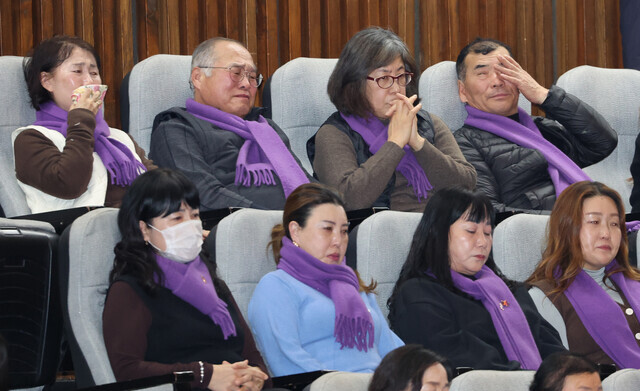hankyoreh
Links to other country sites 다른 나라 사이트 링크
Over a year after deadly Itaewon crush, S. Korean parliament passes law to investigate tragedy

A special law to investigate the deadly crowd crush that occurred in Seoul’s Itaewon neighborhood in October 2022 passed the National Assembly on Tuesday, by opposition lawmakers.
The legislation comes 15 months after the tragedy occurred.
In a regular session that afternoon, the National Assembly approved the Democratic Party’s amended bill for guaranteeing the rights of victims of the October 2022 Itaewon tragedy, investigating the incident, and preventing similar incidents from occurring, with 177 out of 177 lawmakers present voting in favor.
The ruling People Power Party (PPP) exited the session and boycotted the vote to protest the opposition’s passage of the legislation after a failure to reach a bipartisan consensus.
As recently as that morning, the two parties had been negotiating over the formation of a special investigation commission based on an arbitration plan presented by National Assembly Speaker Kim Jin-pyo, but they ultimately failed to reach an agreement.
The special act passed on Wednesday calls for the establishment of a special investigation commission with 11 members in all, including three permanent members. Three of the members are to be nominated by the National Assembly speaker based on discussions with relevant groups, including family members of the victims. The ruling party (defined as a party to which the president currently belongs or has belonged) is to name four members, and the president is to appoint four others nominated by the opposition.
One permanent member each is to be nominated by the speaker, ruling party, and opposition parties.
The chairperson will be selected from among the permanent members by a special commission vote.
The commission is to remain active for a 15-month period. The act is to enter effect as of April 10, which means its investigation activities will begin after the general election.
In consideration of ruling party objections, provisions in the opposition’s original draft that would have granted the special commission authority to demand a special prosecutor were removed, and the activity period was reduced by three months from the original 18 months.
In a statement, Democratic Party floor spokesperson Lim O-kyeong said, “I apologize to the family members of victims in the Itaewon tragedy and to the South Korean public for the fact that it has taken over a year since the Itaewon tragedy occurred for a special act to be passed.”
She went on to call for President Yoon Suk-yeol to “take to heart the suffering of the family members and the voices of the public and immediately accept and proclaim the special act for the Itaewon tragedy.”
The PPP responded by expressing objections.
While the vote was taking place, PPP floor leader Yun Jae-ok gathered with other lawmakers in the party to protest in the Central Hall of the National Assembly’s main building.
He denounced the opposition for “choosing partisanship and conflict rather than the safety of the Republic of Korea.”
But the PPP also indicated that it planned to survey opinions within the party rather than immediately discussing the possibility of Yoon exercising his de facto veto authority to request reconsideration of the legislation.
The presidential office shared a message with reporters expressing “dismay over the Itaewon special act being once again unilaterally forced through without a bipartisan consensus.”
It also said that a “statement will be made after the legislation is sent to the administration and opinions have been gathered from the party and relevant ministries.”
Also passed at the regular session that day included were amendments to the Act on Registration and Evaluation of Chemical Substances and Chemicals Control Act, which relax the standard for registering hazard information when manufacturing and importing new chemical materials from 100 kg to 1 metric ton, with variable regulations based on the degree of danger associated with specific chemicals.
Votes were also held on a special law for the creation and management of a Korean space agency and a special law to end the dog meat trade, which bans the raising, breeding, and slaughter of dogs for food.
By Sun Dam-eun, staff reporter; Kang Jae-gu, staff reporter
Please direct questions or comments to [english@hani.co.kr]

Editorial・opinion
![[Column] How tragedy pervades weak links in Korean labor [Column] How tragedy pervades weak links in Korean labor](https://flexible.img.hani.co.kr/flexible/normal/500/300/imgdb/original/2024/0703/8717199957128458.jpg) [Column] How tragedy pervades weak links in Korean labor
[Column] How tragedy pervades weak links in Korean labor![[Column] How opposing war became a far-right policy [Column] How opposing war became a far-right policy](https://flexible.img.hani.co.kr/flexible/normal/500/300/imgdb/original/2024/0702/5017199091002075.jpg) [Column] How opposing war became a far-right policy
[Column] How opposing war became a far-right policy- [Editorial] Korea needs to adjust diplomatic course in preparation for a Trump comeback
- [Editorial] Silence won’t save Yoon
- [Column] The miscalculations that started the Korean War mustn’t be repeated
- [Correspondent’s column] China-Europe relations tested once more by EV war
- [Correspondent’s column] Who really created the new ‘axis of evil’?
- [Editorial] Exploiting foreign domestic workers won’t solve Korea’s birth rate problem
- [Column] Kim and Putin’s new world order
- [Editorial] Workplace hazards can be prevented — why weren’t they this time?
Most viewed articles
- 1South Koreans living near border with North unnerved by return of artillery thunder
- 2Car behind deadly crash began rapid acceleration after exiting underground garage
- 3S. Korea “monitoring developments” after report of secret Chinese police station in Seoul
- 4Democrats ride wave of 1M signature petition for Yoon to be impeached
- 510 days of torture: Korean mental patient’s restraints only removed after death
- 6Families, friends mourn loved ones cut down in prime in deadly car crash
- 7[Column] How tragedy pervades weak links in Korean labor
- 8Hyundai Motor sets up one-stop shop for EV production in Indonesia
- 9Samsung barricades office as unionized workers strike for better conditions
- 10[Column] The miscalculations that started the Korean War mustn’t be repeated